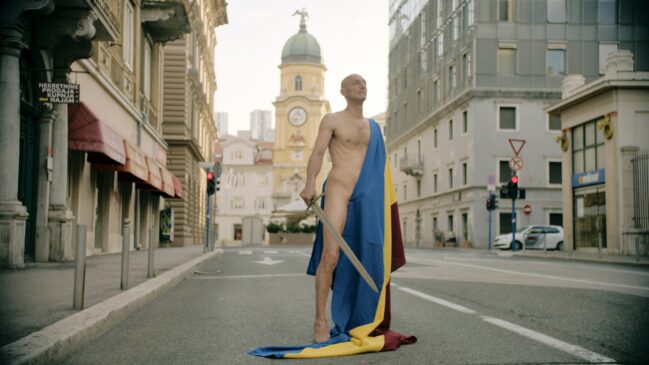




Wri/Dir: Igor Bezinovic | Doc 112′ 2025
In 1919, outraged by the outcome of the Paris Peace Conference, which proposed handing the city of Fiume (now Rijeka, Croatia) to Yugoslavia, Italian poet, aristocrat, and army officer Gabriele D’Annunzio occupied the city.
The ensuing 16-month occupation stands as one of history’s most peculiar experiments in governance. Pier Paolo Pasolini called it a “narcissistic escapade,” while most Italians looked/look upon it as a jape, a humorous adventure. The ‘événement’ was to the people of Fiume/Rijeka not about a “revolution,” an “endeavour” or “exploit.” In Italian it’s the difference between “l’occupazione di Fiume” and “l’impresa di Fiume.”
Through dramatic reconstruction and documentary asides, Igor Bezinović captures the spirit of D’Annunzio and his nascent fascism in his attempts to annex the city. Bezinović, whose earlier film A Brief Excursion premiered at IFFR in 2017, now returns with an essay/documentary hybrid that uses the contemporary citizens of this coastal town that resides on the Adriatic sea.
The city, like quite a few others that were part of the Austro-Hungarian Empire, has belonged to eight different countries, in that sense it belongs to a unique club with other such cities like Trieste (where recently a statue of D’Annunzio was unveiled) and Alexandria.
The film starts with the filmmaker interviewing market goers in Rijeka about their knowledge of D’Annunzio, while making us aware of how many streets, squares and institutions are still named after this fascist rebel. Uniquely what he did do was document his occupation by way of over 10,000 photographs. Only a few citizens can tell the filmmaker who he was and that he was a fascist. They are then invited to take part in the film by playing D’Annunzio and his soldiers.
The film is at once playful but disingenuous. Trying its utmost to deconstruct history a la Radu Jude, especially his film I Do Not Care If We Go Down in History as Barbarians. The difference between Jude and Bezinović though is that Jude never shies away from the difficult history of his country. While Bezinović talks about fascism like it is a relic of Croatian history from the early part of the 20th century. Whereas if we pay attention to the backgrounds of various modern locations we can see neo-fascist graffiti.
In fact the shadow that looms over this film and is never mentioned is the Ustaše, Ante Pavelić and what was to come during the second world war. This history and its relation to the Yugolavian Civil War is documented in Travis Wilkinson’s brilliant documentary: Through The Graves The Wind Is Blowing, which premiered at the Berlinale last year.
In Hegel’s book: Lectures on the Philosophy of History, he talks about ‘historicism’ as the idea that human societies and their activities are defined by their history; and that history is a process of development that builds on the past while also reacting against it. Which one hopes the future of Croatia will arrive at. @ D W Mault
TIGER AWARD | FIPRESCI AWARD | ROTTERDAM INTERNATIONAL FILM FESTIVAL 2025